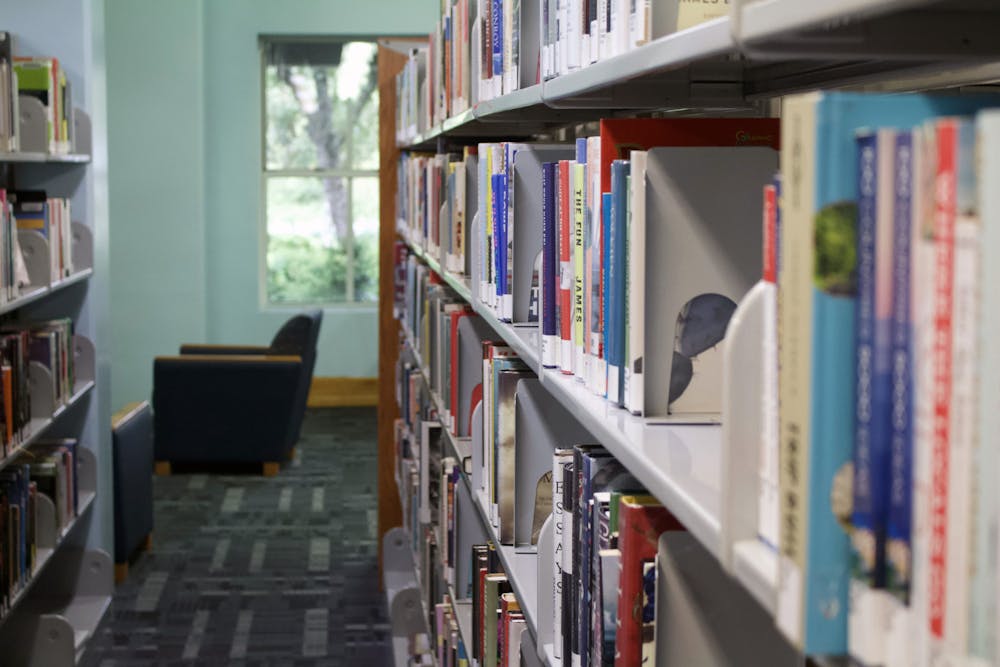Nearly one in five adults in Alachua County can’t read well enough to navigate daily life – part of a rising tide of illiteracy that has quietly surged across the country in recent years.
The problem is mirrored nationally, with American adults who scored in the lowest rates of literacy proficiency climbing nine percentage points in six years.
The UF Lastinger Center for Learning is a research hub under UF’s College of Education. It researches solutions to improve teaching, learning and child care.
The Lastinger Center’s Comprehensive Literacy Needs Assessment gathered data from more than 1,300 Alachua County community members, including educators, students and parents. The report compiled nine months of independent study, in addition to state and nationwide studies and Alachua County Public Schools data.
The report’s results detail how illiteracy can damage an adult's social and financial well-being and professional mobility. Alachua County organizations are attempting to close the gaps.
Barbara Reardon, a literacy coordinator for the Alachua County Library District, said adults face a variety of barriers navigating literacy. As adults get older, it becomes more difficult to build literacy skills and more challenging to reach illiterate adults who may struggle economically, she said.
Supporting illiterate adults can be challenging for organizations like the Alachua County Library District, she said, because it’s harder to get information to someone who struggles with reading. Families with illiterate parents can also impact their children’s literacy, she added.
A study by the National Institutes of Health found that a mother’s literacy level is the greatest determinant of her child’s academic success and literacy level. The National Library of Medicine also found low-income families have fewer parent-child verbal interactions.
“This is certainly a cyclical problem,” Reardon said. “If we have adults in a family that have low literacy, then it’s much more difficult for those children to get the support and the exposure to reading.”
According to the Lastinger Center report, 64% of adult learners nationwide are employed and parents of school-aged children. “Adult learners” refers to individuals age 16 and older who didn’t complete K-12 education or possess a high school diploma but have gaps in educational skills like reading, math and spoken English.
Alison Keel, a 62-year-old Gainesville resident, is a volunteer tutor for the Alachua County Library District’s adult literacy program.
The free program offers one-on-one tutoring to adults struggling with literacy tasks. Keel has volunteered with the program since 2022.
Improving literacy isn’t as simple as someone’s ability to read, she said, but also extends to life experience.
Some of her students may be able to decode words through phonics, she said, but if they have no context for what the word means, it becomes a “nonsense” word, where students know it’s a real word but lack real-world context, making it difficult to understand what they’re reading.
Many students can sound out and read words, but some can’t visualize them, she added.
Reading is often a visual experience, where people picture the words or descriptions they’re reading. Those facing literacy challenges may be too unfamiliar with the words to visualize them, she said.
Some of her students may lack context for new words, especially if they originate outside of where they lived or grew up, which can also limit their ability to comprehend, she said.
One of her biggest achievements as a tutor is seeing her students increase their self-esteem as they gain literacy skills. She’s watched them “make better decisions” as their self-confidence grows and they invest more in their education, she said.
“Once a student can see that they learned, that somebody is investing in them, that they’re getting smarter…when they feel that they can learn, they have more self-esteem,” Keel said.
Seeing her students face their literacy gaps and participate in the program is admirable, Keel said. She wonders why the adults she’s worked with lacked resources growing up, she added.
“I think if they can work this hard now, then why didn’t they get this in school?” she said. “These are hard workers, and they’re clearly self-motivated, so I feel like the school systems let them down.”
Socioeconomic status can serve as a barrier for some experiencing illiteracy. Studies show low-income students are more likely to experience educational inequality, and the rate is higher in minority groups.
Since public schools are funded by local taxes, those in low-income areas will often attend low-income schools, which experience a deficiency of resources and teachers.
One Alachua County organization, PEAK Literacy, seeks to limit literacy disparities in low-income children.
Vincent Hampton, a 34-year-old Gainesville resident, was one of PEAK Literacy’s original board members. Multiple Alachua County communities need more support in navigating illiteracy, especially low-income communities, he said.
Alachua County had a poverty rate of 19% in 2023, which was 7% higher than the statewide rate.
County literacy rates might be slightly higher than statewide rates because of the county’s proximity to a prominent university like UF, Hampton said.
Low-income communities still may be inadequately addressed and face stigmas surrounding illiteracy, he added.
“It kind of goes back to that historical and generational trauma that I see on a daily basis,” Hampton said. “It’s multilayered. There’s trauma, so that means there’s usually shame. It’s hard to acknowledge.”
In Alachua County, Black students had significantly larger achievement gaps than white students in K-12 English Language Arts during the 2023-24 school year, according to the Florida Department of Education.
Statewide, there is a 24-percentage-point gap in language arts achievement, where 64% of white students score a level 3 or above, compared to 40% of Black students.
The gap widens to 42 percentage points in Alachua County, where 70% of white students and 28% of Black students achieve a level 3 or better.
According to the Lastinger Center report, the county’s economically disadvantaged students had lower on-time graduation rates than economically disadvantaged students statewide.
He compared individuals facing issues of illiteracy and generational trauma to going through therapy. If someone goes into therapy closed off, they’ll struggle to heal effectively, he said. Communities facing illiteracy challenges need to be empowered to connect with each other, he added.
“It’s not just about an organization coming in and being the savior, it’s about empowering our community to help itself,” Hampton said. “The best sustainable development comes from empowering the community within.”
Contact Logan McBride at lmcbride@alligator.org. Follow him on X @logandmcbride.

Logan McBride is a journalism junior and the Fall 2025 K-12 education reporter. In his free time, he enjoys watching TV shows or playing basketball at Southwest Rec. He is also a big football fan and will die for Dak Prescott.






